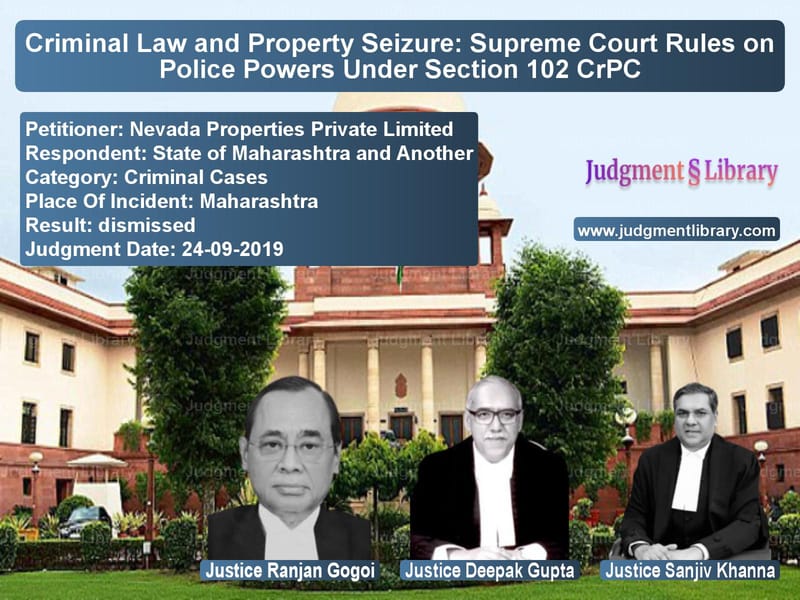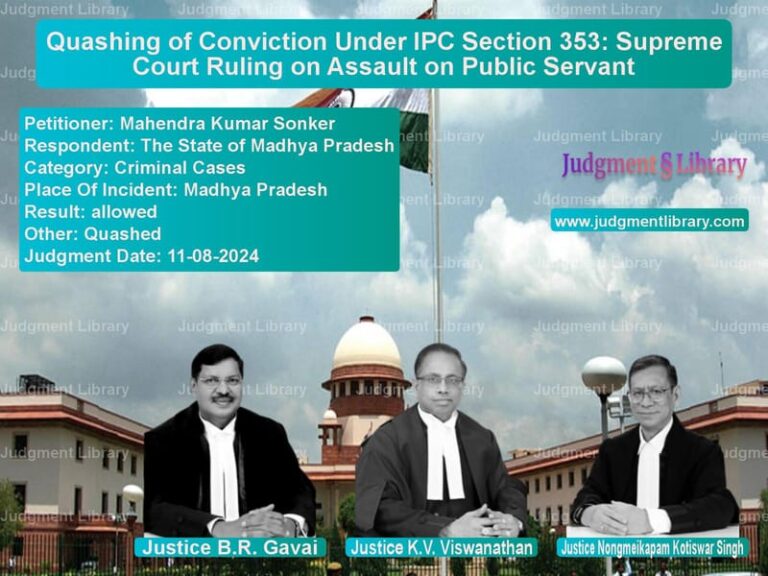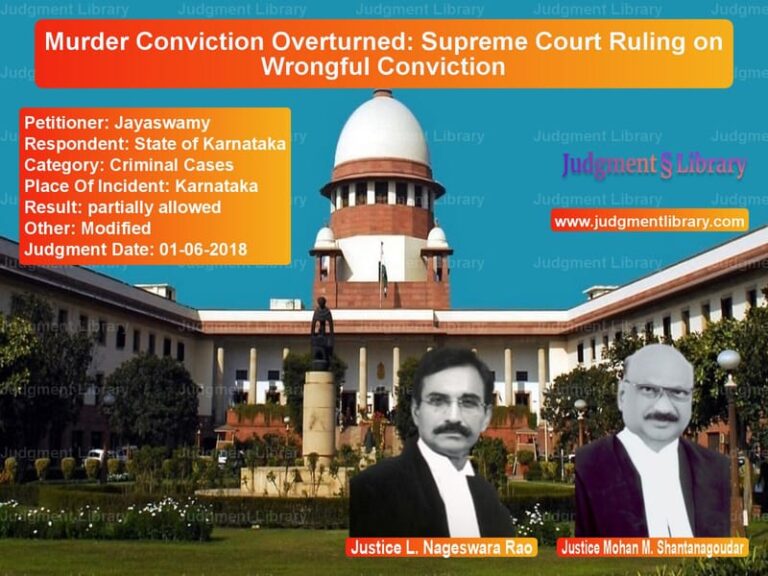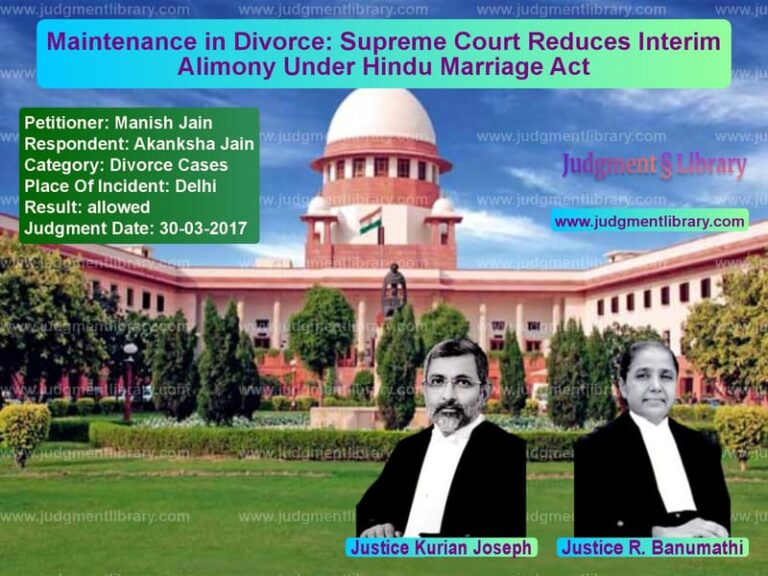Criminal Law and Property Seizure: Supreme Court Rules on Police Powers Under Section 102 CrPC
The case in question involves a critical legal issue regarding the interpretation of Section 102 of the Code of Criminal Procedure (CrPC), which grants police officers the power to seize property suspected to be linked to a crime. The Supreme Court, in the appeal filed by Nevada Properties Private Limited against the State of Maharashtra, examined whether this provision extends to immovable property.
Background of the Case
The dispute arose when Nevada Properties Private Limited challenged a decision of the Bombay High Court, which held that police officers do not have the authority to seize immovable property under Section 102 of the CrPC. The case was referred to a larger bench for consideration due to its significant legal implications.
The key question before the Supreme Court was whether the phrase “any property” in Section 102 includes immovable property and whether a police officer can seize and take custody of such property during an investigation.
Arguments of the Petitioner (Nevada Properties Private Limited)
The petitioner contended that:
- The term “any property” in Section 102 should be interpreted broadly to include immovable property.
- The police should have the authority to seize immovable property to prevent its unlawful use and ensure that it is not tampered with during the investigation.
- Excluding immovable property from the scope of Section 102 would allow criminals to continue benefiting from unlawfully acquired property.
Arguments of the Respondent (State of Maharashtra)
The respondents countered that:
- Section 102 CrPC does not explicitly grant police officers the power to seize immovable property.
- The provision is meant to deal with items that can be physically taken into police custody and produced in court as evidence.
- Allowing police officers to seize immovable property could lead to abuse of power and unnecessary encroachments on private rights.
Supreme Court’s Observations and Judgment
The Supreme Court analyzed various legal precedents and statutory provisions before arriving at its decision. The Court observed:
“Section 102 postulates seizure of the property. Immovable property cannot, in its strict sense, be seized, though documents of title, etc. relating to immovable property can be seized, taken into custody, and produced. Immovable property can be attached and also locked/sealed. It could be argued that the word ‘seize’ would include such action of attachment and sealing. However, language of Section 102 of the Code does not support the interpretation that the police officer has the power to dispossess a person in occupation and take possession of an immovable property in order to seize it.”
The Court also noted that the purpose of Section 102 is to facilitate criminal investigations by allowing police to secure relevant evidence, which typically consists of movable property that can be physically transported to court. The provision is not designed to deal with immovable property disputes, which are better suited for civil proceedings.
The Court further clarified:
“Given the nature of criminal litigation, such seizure of an immovable property by the police officer in the form of an attachment and dispossession would not facilitate investigation to collect evidence/material to be produced during inquiry and trial.”
As a result, the Supreme Court ruled that:
- Police officers do not have the power to seize immovable property under Section 102 CrPC.
- However, they can seize documents relating to immovable property, such as title deeds, as these are movable property and may serve as evidence in a criminal case.
- Disputes over immovable property should be resolved through civil courts rather than being addressed by police actions under criminal law.
Key Takeaways from the Judgment
- Limited Scope of Police Powers: The ruling clearly delineates the powers of the police under Section 102 CrPC, preventing any overreach concerning immovable property.
- Protection of Property Rights: The judgment safeguards individuals from arbitrary police actions that could result in the wrongful dispossession of property.
- Clarification on Legal Interpretation: The decision provides clarity on the distinction between criminal and civil remedies, ensuring that property disputes are handled appropriately.
Impact of the Judgment
- Strengthening Property Rights: This ruling reinforces the principle that property rights should not be interfered with arbitrarily by law enforcement agencies.
- Guidance for Law Enforcement: It provides clear guidelines for police officers, ensuring that they do not overstep their jurisdiction in property-related matters.
- Precedent for Future Cases: The judgment sets a precedent that can be applied in similar cases involving the seizure of property during criminal investigations.
Conclusion
The Supreme Court’s decision in this case is a significant ruling that clarifies the extent of police powers under Section 102 of the CrPC. By ruling that immovable property cannot be seized, the Court has upheld the principles of due process and ensured that property disputes are addressed through the appropriate legal channels. This judgment is expected to have a far-reaching impact on future cases involving property seizures and criminal investigations.
Petitioner Name: Nevada Properties Private Limited.Respondent Name: State of Maharashtra and Another.Judgment By: Justice Ranjan Gogoi, Justice Deepak Gupta, Justice Sanjiv Khanna.Place Of Incident: Maharashtra.Judgment Date: 24-09-2019.
Don’t miss out on the full details! Download the complete judgment in PDF format below and gain valuable insights instantly!
Download Judgment: Nevada Properties Pr vs State of Maharashtra Supreme Court of India Judgment Dated 24-09-2019.pdf
Direct Downlaod Judgment: Direct downlaod this Judgment
See all petitions in Custodial Deaths and Police Misconduct
See all petitions in Legal Malpractice
See all petitions in Other Cases
See all petitions in Judgment by Ranjan Gogoi
See all petitions in Judgment by Deepak Gupta
See all petitions in Judgment by Sanjiv Khanna
See all petitions in dismissed
See all petitions in supreme court of India judgments September 2019
See all petitions in 2019 judgments
See all posts in Criminal Cases Category
See all allowed petitions in Criminal Cases Category
See all Dismissed petitions in Criminal Cases Category
See all partially allowed petitions in Criminal Cases Category







